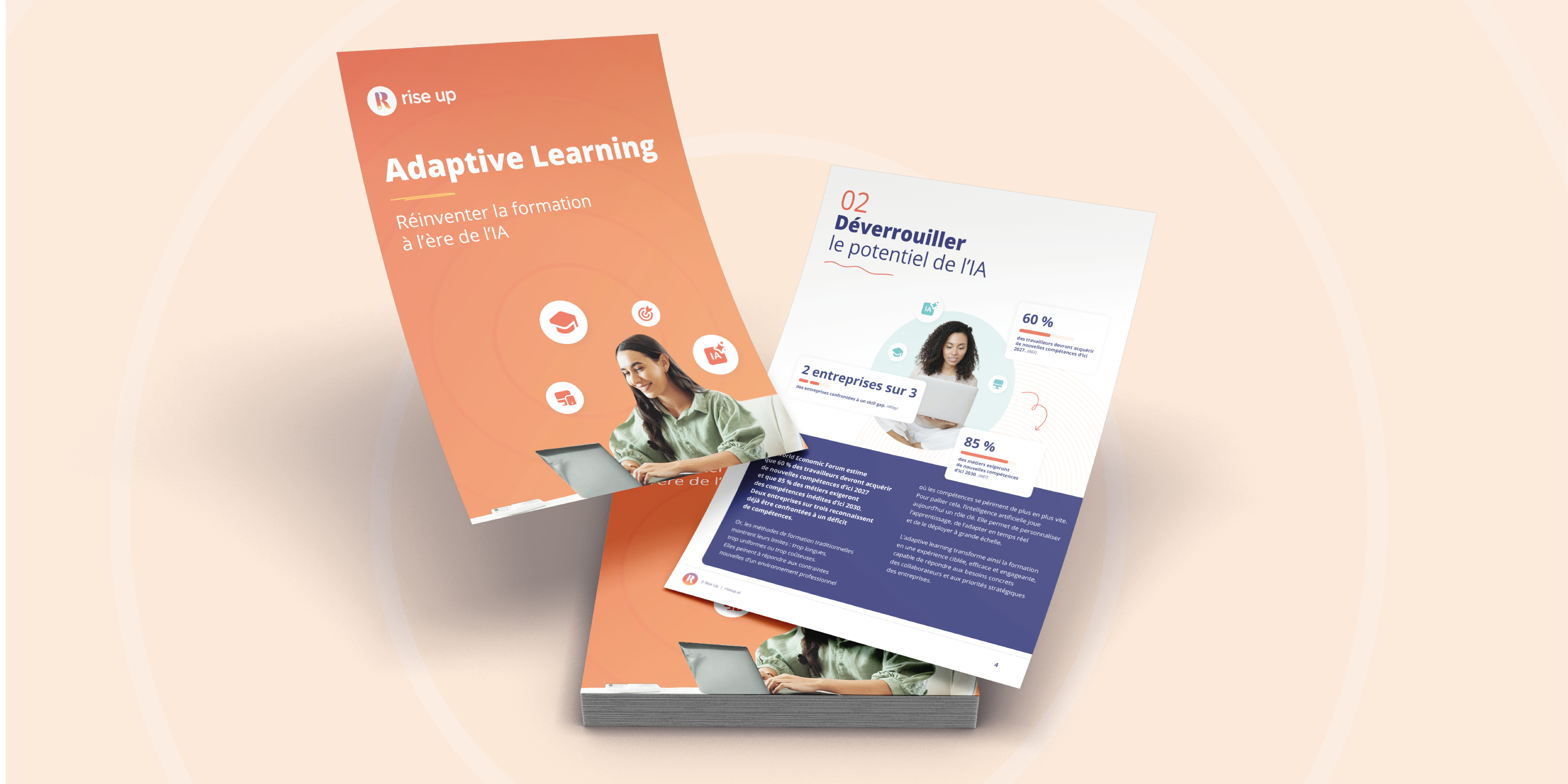Key skills in a hybrid work environment
11 minutes of reading | 2022-08-25
How have key skills changed since the pandemic and the emergence of hybrid working? In this article, Rise Up sets out the key skills required in a post-Covid work environment.
Key skills refer to the aptitudes that employees need to carry out the tasks assigned to them and cope with the different professional situations they encounter.
They are underpinned by essential skills, which are the skills required not just in the world of work but in every walk of life. Essential skills relate to an individual’s ability to deal with a range of professional and social situations. They include basic literacy and numeracy, working with others and problem solving.
While essential skills are universal, key skills are changeable. In other words, key skills in the workplace are shaped by changes in the world of work. Unsurprisingly, given the widespread shift to hybrid working, key skills are evolving much more rapidly than ever before. The move to remote working, greater flexibility and mobility and the economic and social disruption caused by the pandemic has meant that the key skills required just a couple of years ago have become obsolete – and new key skills have risen in importance.
So, how have key skills changed since the pandemic and the switch to hybrid working? Rise Up explains it all!
Key skills in a post-Covid, hybrid working environment
We all know that the pandemic and successive lockdowns have required companies and their staff to adapt considerably to the new reality. Supply chain disruptions, shifting from physical sales to e-commerce, the widespread uptake of remote working, rapid digitalisation... these are all sudden and unexpected upheavals that we have had to face.
In terms of how work is organised, there has been a seismic shift. We can see a clear distinction between our ways of working before the pandemic, and our ways of working now. In this context of hybrid working, how have key skills in the workplace evolved, and what are the current trends? Which aptitudes are best able to support employee performance in a changing environment?
Here, we’ll set out the seven most important key stills for a post-Covid world.
Remote collaboration
The first key skill in a hybrid working environment is remote collaboration. Working together has never been more important, given that employees now have to work with a diverse range of people remotely, including colleagues and clients in different countries and time zones. The ability to form relationships has therefore risen in importance – yet in the same breath, this is more challenging to achieve remotely.
Given these profound changes in the ways we work with people, being able to master collaborative tools has become crucial. Essentially, this requires technical skills, along with an ability to adapt to digital work spaces. Being comfortable using applications such as Microsoft Teams, which bring together multiple functions (messaging, calling, videoconferences, file sharing, etc.,), and knowing how to use a shared calendar or file storage/sharing service has become a given in most organisations.

Being able to speak a foreign language (or even several!) is another, highly desirable asset that can facilitate cross-cultural communication.
For managers in particular, they are faced with the considerable challenge of creating an effective collaborative environment while coming up with new ways of promoting exchanges. With employees in different locations, managers are therefore having to find ways to optimise team work while preventing and ironing out any misunderstandings to ensure that employees work well together remotely.
Digital communication
Central to smooth and effective collaboration is seamless communication. As mentioned above, the ability to master digital tools is crucial in the post-Covid era. Employees are now required to use online solutions geared towards group or one-to-one exchanges, such as Slack, on a day-to-day basis.
Another dimension to consider in this area is the quality of the information being circulated. The relevance of an exchange can be measured by its content, to a large extent. Communications need to be justified, relevant and to the point. In other words, communicating well involves adding value to information, be it an expert assessment, a well-presented analysis or a new strategy.
To engage your audience, you also need to use an appropriate channel to convey the information (e.g., publishing an article on social media or on a blog, releasing a podcast or video, etc.).
Adaptability
The transferable skill that companies are holding in increasingly high esteem is adaptability. Being an agile and adaptable employee means being able to respond to new situations while continuing to work at the same speed and level of efficiency.
This aptitude requires being able to cope with stress under any circumstances. An adaptable employee will feel perfectly at ease in a professional environment that is constantly changing and filled with uncertainty. As jobs undergo rapid transformation, aspirations are changing, and non-linear careers are becoming the norm. In this context, the ability to adapt is a real asset.
Agility therefore refers to the ability to change. Being able to assess their own strengths and weaknesses, take time out for training to work on soft skills and see unknowns as stimulating challenges are all excellent reflexes that agile employees possess.
Creativity and innovative thinking
Creativity is an essential skill at work. Why? Because creative employees are able to come up with truly original solutions to problems or challenges. With their ideas and vision, they are capable of removing obstacles that are blocking the development of a project or preventing a team from working well together.
An individual gifted with creativity is not afraid to go against the grain and embrace different forms of expression (artistic, cultural, etc). They have a real ability to innovate and bring value to the company. In order to thrive, they need a stimulating and inspiring environment.
Taking the initiative and being enterprising
Taking the initiative and being business-minded is another important behavioural competency in the era of hybrid working. Developing ideas, initiating realistic and well thought-out projects, keeping abreast of changes and turning them to your advantage are all prerequisites to getting ahead in an organisation and keeping up with sector-specific evolutions.
This key skill involves being proactive (i.e., being dynamic and anticipating challenges) as well as demonstrating autonomy. Other qualities associated with taking the initiative include having an appetite for risk and being passionate, which tends to be a driving force for innovative ideas.
Organisation
Another essential transferable skill is being organised. This skill refers to how an employee optimises how they work by structuring and prioritising their workload effectively, all while managing to juggle remote working and office working.
Being well organised also means being ordered and disciplined, as well as having the ability to shut out distractions (such as your mobile phone and the endless notifications from online chats). The result? Perfect time management.

Learning to learn
Maintaining your employability starts with continuous training. The aim is to keep up to date with the innovations impacting your job and develop the skills required to respond to them. In this sense, companies play a leading role and have a duty to become learning organisations that promote the exchange of expertise and peer-to-peer learning.
Key skills and essential skills: what is the difference?
Key skills can be grouped into a certain number of transferable skills and soft skills, as we have seen.
It is also worth pointing out that essential skills are the foundation-level skills that all of us require. They underpin key skills in the workplace but are not confined to the professional world. In fact, essential skills are found in every aspect of life and dictate how we behave with our friends and family and within wider society, as well as at work.
The essential skills defined by the British Council
According to the British Council, essential (or core) skills are the deep learning skills that young people need to possess in order to participate in the global economy. In other words, essential skills are a prerequisite to being employed within an organisation of any kind.
Based on in-depth research, the British Council has identified six essential skills that are critical to meeting the needs of students in the 21st century and a globalised economy.
Here are the six essential skills identified by the British Council:
- critical thinking and problem solving
- collaboration and communication
- creativity and imagination
- citizenship
- digital literacy
- personal development
Interestingly, there is a clear overlap between the essential skills required by students and the key skills required by employees. In an ideal system, students would learn to master all of the essential skills above and make a smooth transition over to the world of work. However, skills gaps still persist.
Illiteracy, for instance, constitutes a specific yet somewhat hidden challenge. In England, 7.1 million people can be described as having very poor literacy skills, according to the National Literacy Trust. In other words, they can understand short, straightforward texts on topics that are familiar to them, and obtain information from everyday sources, but they may encounter problems with information on unfamiliar topics or information from unfamiliar sources. Essentially, what this means is that 16.4% of adults in England are ’functionally illiterate’.
The implications of poor literacy on earning potential are stark. According to the UK charity Pro Bono Economics, a worker with poor literacy skills would have to work an extra 18 months in their lifetime to earn the same as a worker with basic communication skills. And the average 18-year-old with very poor literacy skills will earn around £33,000 less over their working life.
Fortunately, some companies are actively trying to address such essential skills gaps. In June 2021, the chair of John Lewis announced that literacy and numeracy lessons would be provided to all staff. However, according to a report published by the CIPD, the picture across the board is quite different. In fact, many employers are “training less and investing less in their workforces than two decades ago”. So, how can organisations help to reinforce essential and key skills in the workplace?
How to train employees in key skills
We know that lifelong learning is an effective strategy for keeping key skills up to date, both in a work context and in day-to-day life. But post-pandemic, trainers are coming up against a new challenge of enabling employees to develop in an uncertain and ever-changing professional world, which is changing the key skills required for the workplace.
With this in mind, Rise Up has developed a unique offering, Rise Up Content, with the aim of developing the aptitudes, skills and knowledge of each employee according to their needs and existing skill sets. Our ambition is to upskill employees quickly and effectively, boosting their career development and progression.
The most important key skills, whether they are essential skills or transferable skills, can be learned via engaging and stimulating content, available directly on the LMS platform. The content covers several different topics, including:
- written and oral communication, as well as body language;
- learning to learn;
- foreign languages;
- time management;
- remote working;
- digital skills to improve online collaboration via different tools, such as Microsoft 365.
Supported by specialist partners, Rise Up offers a rich and diverse off-the-shelf training course catalogue designed to help employees and businesses respond to any challenges they may encounter.






